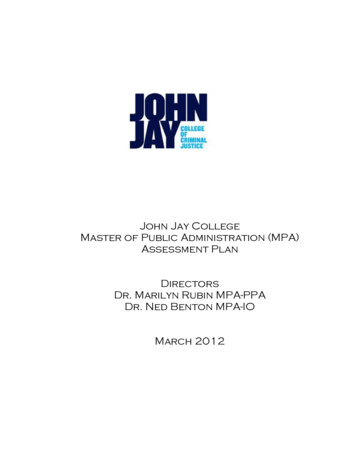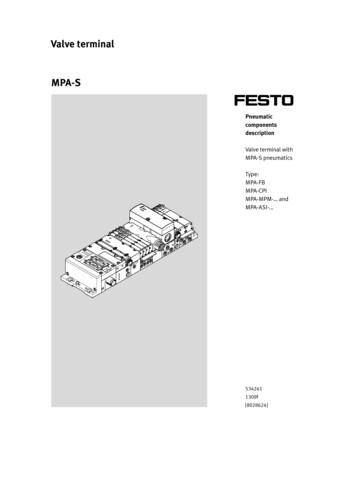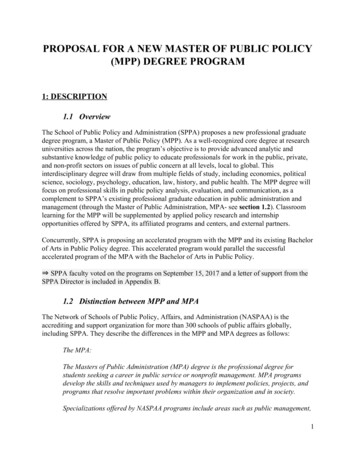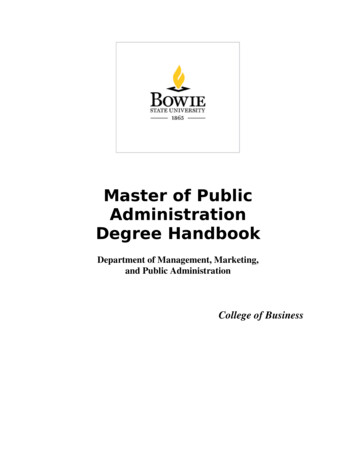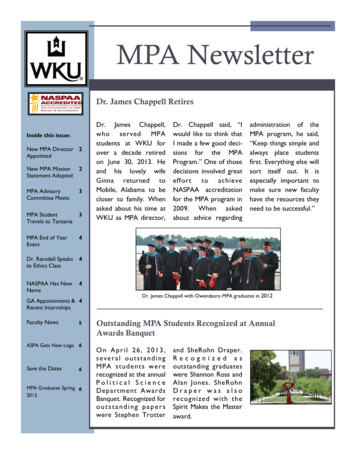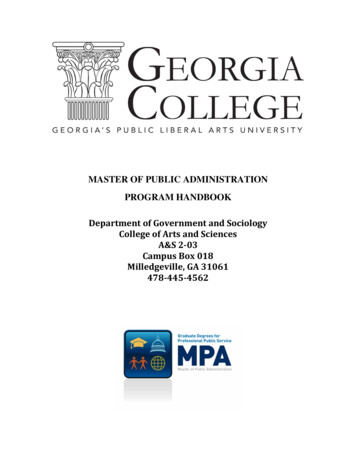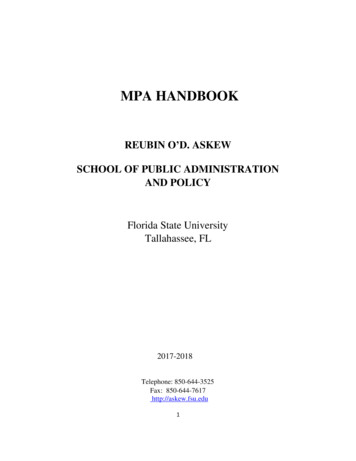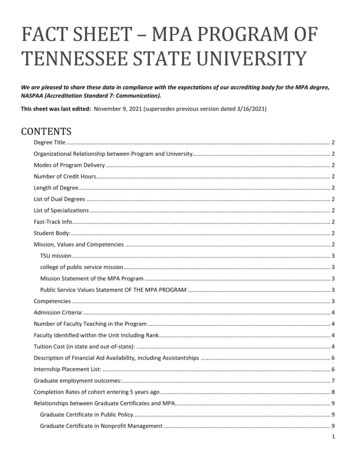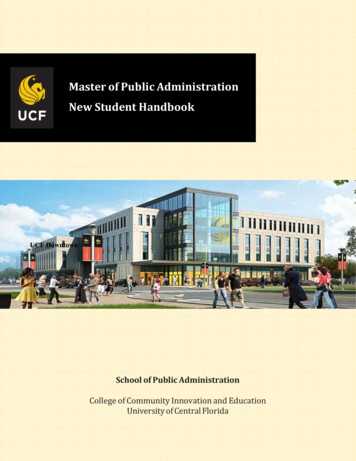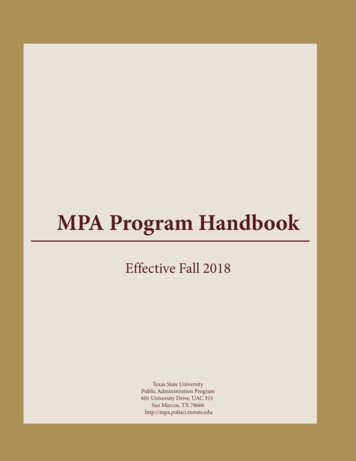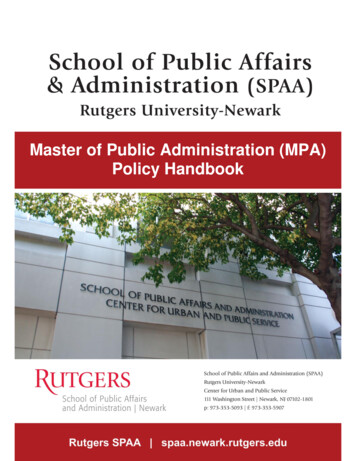
Transcription
Master of Public Administration (MPA)Policy HandbookUpdated: 5.19.2016 (TA)
Table of ContentsPREFACE .3SCHOOL OF PUBLIC AFFAIRS AND ADMINISTRATION .4MPA PROGRAM REQUIREMENTS FOR MPA AND ONLINE MPA . 6ADDITIONAL ADMISSIONS AND ENROLLMENT REQUIREMENTS FOR INTERNATIONAL STUDENTS . 6APPLICATION DEADLINE . 7ORIENTATION . 7CURRICULUM/CREDITS . 7AREAS OF CONCENTRATIONS/ELECTIVES . 8CONCENTRATION COURSE LISTING . 8COURSE SCHEDULES/SYLLABI. 9FULL-TIME VS. PART-TIME/CREDIT OVERLOAD . 9FINANCIAL AID. . 9INTERNSHIP . 9INDEPENDENT STUDY . 10CAPSTONE PROJECT. 10DUAL DEGREES . 11ACADEMIC POLICIES . 14GRADING SYSTEM . 14INCOMPLETE GRADES. 14GRADE APPEALS . 14FAILING GRADES . 16ACADEMIC STANDING AND ANNUAL ASSESSMENT . 16GRADUATION REQUIREMENTS. 16FIRST SEMESTER REQUIREMENT (INTRO TO PA) POLICY . 17ADD/DROP . 17DEREGISTRATION/REINSTATEMENT . 17LATE REGISTRATIONS . 17LEAVE OF ABSENCE AND TIME LIMITS ON COMPLETION OF THE DEGREE . 17WITHDRAWAL/DISMISSAL . 18TRANSFERRING GRADUATE CREDITS FROM AN UNDERGRAD DEGREE . 18TRANSFERRING GRADUATE CREDITS . 18CURRICULAR PRACTICAL TRAINING (CPT) POLICY . 19ACADEMIC INTEGRITY. 19SCHOLARSHIPS. 20PI ALPHA ALPHA HONOR SOCIETY . 21ON-CAMPUS STUDENTS TAKING ONLINE CLASSES . 21TUITION REMISSION . 21STUDENT SERVICES . 22WRITING AND CAREER DEVELOPMENT CENTER . 22COACHING SESSIONS . 22CAREER SEMINARS . 22EDITING SERVICES. 22LOCATION . 22PUBLIC ADMINISTRATION GRADUATE ASSOCIATION (PAGA) . 23COMPUTER LABS . 23ADVISING . 23COUNSELING AND HEALTH SERVICES . 23HOUSING . 24PARKING . 24ID CARDS . 24Updated: 07.14.20172 P age
PREFACEThis handbook serves as a reference for all Master of Public Administration (MPA) andExecutive Master of Public Administration (EMPA) students. It provides essential informationon a variety of policies and procedures relevant to graduate students at Rutgers UniversityNewark’s School of Public Affairs and Administration (SPAA), ranging from admission andmatriculation to graduation.Every student bears individual responsibility to be aware of the policies, procedures, deadlines,and regulations provided in this handbook. While many of the policies included here may neverapply to you, others apply to every student. This handbook will be revised from time to time;please ensure you are using the most current version, which will always be provided on theSchool of Public Affairs website.If a student has a concern or question that is not covered here, they should seek advice from theiracademic unit. The following list will help identify appropriate contacts.Dr. Annie VirkusAssociate Dean for Student & Academic Services973-353-1351Policy AppealsDr. Stephanie NewboldAssociate Professor and Director of the MPA A curriculum/courses, Approvals for Internships, Independent Studies, Exceptions to MPAPolicies, Grade AppealsGail DanielsAssistant Dean for Student Servicesgaild@rutgers.edu973-353-1122Admissions, Withdrawals, and GraduationAdvising for MPA studentsUpdated: 07.14.20173 P age
SCHOOL OF PUBLIC AFFAIRS AND ADMINISTRATIONGuided by the principles of Knowledge, Competence, Diversity, Service and Ethics – with anemphasis on public service values and competencies for effective performance – SPAA promotesaccountability, transparency, and performance in the public and nonprofit sectors.Rutgers SPAA is highly ranked by U.S. News and World Report and fully accredited by theNetwork of Schools of Public Policy, Affairs, and Administration (NASPAA) and TheInternational Commission on Accreditation of Public Administration Education and TrainingPrograms (ICAPA).Rutgers SPAA educates and motivates students to choose careers in public service andadministration through its innovative and comprehensive undergraduate program in Public andNonprofit Administration (BA), and its Master of Public Administration (MPA), ExecutiveMPA, PhD, and professional and graduate certificate programs.Over 1,200 students are registered annually in SPAA’s PhD, Master of Public Administration(MPA), Executive MPA, Master of Public Health, and BA in Public and NonprofitAdministration degree programs, as well as our many certificate programs. Over 25% of SPAAstudents are international, representing over 30 countries. SPAA graduates are teaching andearning tenure at dozens of universities and hold executive-level positions in the nonprofit andpublic sectors in the U.S. and around the world.World Class FacultyThe school’s faculty generates knowledge and best practices in public service andadministration, and collaborates with public and nonprofit organizations and professionalsthroughout the U.S. and the world.SPAA has over 25 faculty members whose areas of expertise include public and nonprofitmanagement and administration, public performance measurement and reporting, publicbudgeting and finance, economic development, health, and urban affairs. Five faculty aremembers of the Congressionally-chartered National Academy of Public Administration (NAPA).MissionThe Rutgers University-Newark School of Public Affairs & Administration prepares highlymotivated individuals seeking to establish or further their careers as leaders in public andnonprofit organizations. We are especially proud to expand opportunities for students fromworking class, urban, minority, and other underserved populations in both the US and abroad.As the state’s public university, we have special commitment to strengthening New Jersey’spublic and nonprofit organizations, but we also have a strong reputation among studentsinternationally, and increasingly in other states. This makes the School a culturally andintellectually rich and diverse place to learn. Many of our students go on to careers in local,state, and provincial level organizations in New Jersey and internationally. We blend a solideducation in public sector and nonprofit fundamentals with internationally-recognizedspecializations in performance measurement, nonprofit management, and information andtechnology management. We also have special opportunities in law, criminal justice, publicUpdated: 07.14.20174 P age
health, human resources, and public finance.VisionSPAA is recognized for its knowledge and competence in public service and administration, withparticular attention to the fields of performance measurement, management, and improvement.SPAA is dedicated to diversity and ethical values across all of its programs.Rutgers SPAA RankingsU.S. News & World Report ranks the Rutgers University-Newark School of Public Affairs andAdministration as;Updated: 07.14.20175 P age
MPA PROGRAMRequirements for MPA and Online MPAAll applications are completed online at http://gradstudy.rutgers.edu and require the followingmaterials: Application Resume Fee of 70 – payable to Rutgers University Official Transcripts for colleges and universities attended (A bachelor’s degree from arecognized institution of higher education is required) Three Letters of Recommendation Personal Statement – one page explaining “Why You Are Pursuing an MPA Degree” GRE and TOEFL scores (if applicable*)*All students with a GPA lower than 3.0 are required to submit GRE scores. All internationalstudents have to submit a TOEFL score.For More Information on Graduate AdmissionsGail DanielsAssistant Dean for Graduate Programsgaild@rutgers.edu973-353-1122Additional Admissions and Enrollment Requirements for International StudentsThe minimum acceptable TOEFL score for regular admission to the MPA program is a 90.Students that score at or above 80 but below a 90 on TOEFL may be conditionally admitted.Once admitted, all incoming international MPA students must take an assessment exam with theRutgers-Newark Program in American Language Studies (PALS).Students who receive less than a score of 80 out of 120 on the “Overall Oxford” measure musttake the course recommended to them by PALS in their first semester in the MPA program.Students who receive above a score of 80 out of 120 on the “Overall Oxford” measure and havereceived at least one recommended course to take from PALS will be monitored for academicprogress in their first semester. Unsatisfactory academic progress includes, but is not limited to,one course grade below a B, or an incomplete in a course. If it is deemed that a student ismaking unsatisfactory progress in their course work, he/she will be required to take therecommended PALS course in their second semester.The MPA director may require students to take additional PALS courses if their “OverallOxford” scores and academic progress indicates it is necessary. In some cases, students may notbe permitted to take MPA courses until they have successfully completed a specified PALScurriculum. PALS classes are available to all international students and students are encouragedto take PALS courses, even if they are not required to do so. If a student fails to take the PALSassessment exam, they will have a dean’s hold placed on future registration, which will preventthe student from registering further until the requirements are satisfied.Updated: 07.14.20176 P age
Application DeadlineThe deadline for priority consideration for fall admission is July 1st; the deadline for priorityconsideration for spring is December 1st. After these dates, applications will continue to bereviewed, although space will be extremely limited. Students are not admitted for summer andwinter sessions but may be permitted to take classes as a non-matriculated student.OrientationOrientation occurs approximately one week before the semester starts. All new students arerequired to attend this orientation. After being accepted for admission, the student will benotified by SPAA to attend the appropriate orientation session.Information covered during orientations includes: Curriculum/Concentrations Requirements/Prerequisites Advising Internships/Independent Study Transfer Credits Graduation Requirements Student Organization (PAGA) Scholarships Honor Society: Pi Alpha Alpha Failing Grades Withdrawal/Incomplete Grades Matriculated vs. Non-matriculated status Accommodations Academic Integrity Public Safety Library Services Writing Center Blackboard OverviewCurriculum/CreditsThe MPA degree at Rutgers SPAA consists of 42 credits of coursework addressing the contextand application of public policy implementation; that is, the design, delivery, leadership,management, performance, and results of public and nonprofit sector activity. These sectorsprovide over 16 million job opportunities in the U.S. alone. Candidates for the master of publicadministration (MPA) degree complete 42 credits, 14 courses of 3 credits each, comprised of 11core courses and 3 concentration/elective courses. Students are expected to take their electivecourses in SPAA, and any variation requires review and approval by the MPA Director.Core CoursesThe core curriculum consists of five core areas listed below.1. Foundation: Provides understanding of public administration contexts and keyprofessional competencies for public and nonprofit sectors.Updated: 07.14.20177 P age
2. Research and Analysis: Examines quantitative and qualitative data methods and researchdesign.3. Management: Provides foundations in organization and human resources management.4. Financial Management: Examines financial contexts and budgeting skills.5. Application: Provides students with the opportunity to utilize what they have learned inthe program via a real-world project.Areas of Concentrations/ElectivesA concentration consists of three courses (3 credits each) in an area of the student’s interest.Concentrations provide greater breadth or depth of knowledge in a specific area of publicadministration. In order to receive a concentration, the student must complete the three electivecourses identified. Limited exceptions include the substitution of one course for another elective(with MPA Director approval), an independent study (with MPA Director approval), or aninternship related to the concentration (with MPA Director approval). In order to receive a dualconcentration, in addition to the core course requirements, students must take two electivecourses from each of the desired concentration areas for a total of four elective courses (3 creditseach) and 45 credits to graduate. This policy also applies to students pursuing availableconcentrations in the online MPA program (Pearson).Concentration Course ListingLeadership of Public Organizations20:834:505 Intergovernmental and Intersectoral Management (3)20:834:507 Leadership and Diversity (3)20:834:527 Labor Relations (3)Budgeting and Financial Management20:834:543 Public Financial Management (3)20:834:545 Capital Budgeting and Debt Management (3)20:834:568 Government Revenue Theory and Administration (3)Nonprofit Management20:834:571 Nonprofit Budgeting (3)20:834:575 Grant Writing and Grants Management (3)20:834:576 Resource Development for Nonprofit Organizations (3)Public and Nonprofit Performance Management20:834:529 Performance Measurement and Reporting for Public and Nonprofit Organizations (3)20:834:578 Results-Driven Strategic Management (3)20:834:526 Evidence-Based Public Management and Policy (3)Healthcare Administration20:834:581 Health Systems and Policy (3)20:834:582 Health Care Management (3)20:834:584 Health Care Finance (3)Technology and Information ManagementUpdated: 07.14.20178 P age
20:834:517 E-Governance and Digital Services (3)20:834:518 GIS for Public and Nonprofit Management (3)20:834:520 Data Management for Public and Nonprofit Organizations (3)By Arrangement20:834:503 Special Topics (By Permission Only)20:834:590 Internship (3) [Prerequisite: Advanced approval of MPA Director]20:834:598 Independent Study (3) [Prerequisite: Advanced approval of MPA Director]All course listings and course descriptions can be found at e-descriptionsCourse Schedules/SyllabiMPA core courses are offered every semester. Concentration courses are offered once per year,and therefore must be taken when they are offered. If there are any questions, you should consultwith your academic advisor. Course schedules and course syllabi can be found on our website at:For MPA: sFor EMPA: esFor Online MPA: hedulesFull-time Vs. Part-Time/Credit OverloadStudents complete the program in two to three calendar years depending upon the number ofcredits taken per semester. Most MPA students are working professionals who take 6 credits persemester (part time), including summers. Nine credits per semester is considered full time at thegraduate level.In order to take 12 credits, credit overload has to be approved by the MPA Director. The studentmust have at least a 3.5 cumulative GPA to request credit overload.Financial AidTo receive financial aid, an MPA student has to register for at least 6 credits and submit aFAFSA form by the deadline. For more information, please visit the Office of Financial Aid athttps://studentaid.rutgers.edu/. There are no financial loans available for the winter session.InternshipThe MPA Program does not require an internship, but encourages internships for pre-career andcareer-changing students. Rutgers SPAA assists on-campus MPA students in locating internshipopportunities with an expanding network of partners in the Newark urban area in local, county,and state government organizations, and among dozens of nonprofit organizations in thesurrounding areas. Additionally, the school circulates information about available national andinternational internship opportunities via regular email announcements. Approval from the MPADirector is required before any internship taken for academic credit begins. Students are limitedto one 3-credit internship; if a student takes an internship, the credits count toward the student’sconcentration, which means he/she takes two elective courses from his/her concentration, ratherUpdated: 07.14.20179 P age
than the customary three. An internship must be related to the student’s concentration. After theMPA Director approves the request, the student will complete the internship contract and submitit to the department for a special permission number to register for credit. An internship can onlycount for an elective and cannot replace a core course.Requirements to receive credits for internship: Submit a completed contract Complete 150 hours of work within one semester Submit mid-semester and final evaluations (by the supervisor and the student) Submit a 10 to 20-page research paper relating the internship to the student’sconcentration (if applicable) at the end of the semester[Prerequisite: Advance completion of internship form and approval of the MPA Director prior to enrollment]Independent StudyIndependent study is available on a very limited basis as a concentration course for students toinvestigate a specific topic or issue in depth. Independent study occurs under the directsupervision of a core faculty member. Independent study requires permission from thesupervising faculty member and MPA Director approval before students may register.Independent study is limited to 3 credits during the course of the MPA program, and it maycount as either a concentration course (with approval) or an elective; Independent Study cannotsubstitute for a core course.Requirements to receive credits for independent study: Approval from a SPAA faculty member to direct the independent study. Submit a detailed description of the proposed topic, the deliverables to be assessed, and arecommendation letter from the supervising faculty member to be considered by theMPA Director for approval. The typical minimum deliverable for Independent Study consists of a substantial researchpaper, including: literature review, collection of data, analysis. The supervising facultymay require additional assignments.[Prerequisite: Advance approval of the MPA Director prior to enrollment]Capstone ProjectThe Capstone course provides students with an opportunity to integrate learning from variouscourses with analysis of real-world issues. Making use of the classroom setting and encouragingteamwork, the capstone project consists of a project design, action plan, and implementation.Students develop individual projects, under guidance of a faculty member, in which they carryout data collection and analysis, evaluate their findings, and provide conclusions andrecommendations. The outputs are a project report and PowerPoint presentation to fellowstudents, faculty members, and invited guests. The capstone seminar serves as a culminatingexperience in the MPA program.The Capstone course meets once a week throughout the semester. The course allows students todraw on material presented throughout the curriculum to develop and conduct an appliedresearch project on a topic salient to public or nonprofit administration. This seminar willUpdated: 07.14.201710 P a g e
prepare students to use the skills they have developed throughout the program to analyze andsolve key problems of public management and policy. Students complete individual practicalanalytic papers suitable for publication or public consumption as their key graded assignment.These papers will demonstrate each student’s unique abilities and their collective body of skillsand knowledge acquired throughout the MPA curriculum. The capstone project challengesstudents to clearly articulate a research question, identify best practices in the field through aliterature review, and develop and execute a research design, in which the student is to:1.2.3.4.5.6.Define a research question that addresses an existing public or nonprofit problem.Identify a theoretical model through which to approach the issue.Select appropriate data collection methods.Collect data.Analyze and interpret the data.Develop a written report and oral presentation of the findings and recommendations.Final projects are presented at a Public Policy and Management Forum during scheduled classtime. At the conclusion of the course, students will have demonstrated effective research skills,excellent oral and written communication skills, and will have displayed the level of knowledgenecessary for effectively managing a public or non-profit organization as a competent leader.[Prerequisites: 26:834:561 Applied Statistics & 26:834:562 Applied Research Design in order]DUAL DEGREESSPAA offers the following dual degrees:JD/MPARutgers University-Newark’s School of Public Affairs and Administration (SPAA) and RutgersSchool of Law-Newark have signed a Memorandum of Understanding to establish a dual JurisDoctor/Master of Public Administration (JD/MPA) degree program. The program allows a fulltime student to complete the requirements for both the JD and MPA degree in four years (eightfull-time semesters). Students who wish to pursue the dual degree must apply for and gainadmission to the JD program and the MPA program separately. The student would normallyspend the first full-time year completing the required curriculum for the JD degree and thesecond full-time year completing the core curriculum for the MPA. During the third and fourthyears of full-time study, the student would take elective courses from either the JD or MPAcurriculum in order to meet the requirements for both degrees. Each program will accept up to 12credits earned at the other toward satisfaction of the JD or MPA degree requirements, allowingthe student to complete the program in eight semesters, rather than the 10 semesters that wouldbe required if the two degrees were earned separately.Program InformationThis dual degree can be completed in four years on a full-time basis (eight full-time semesters).It could take more than eight years on a part-time basis.Students must complete a total of 30 credits at Rutgers SPAA and a total of 72 credits at RutgersLaw School. After applying to both programs, the student should spend the first full-time yearUpdated: 07.14.201711 P a g e
(Fall, Spring, Summer) completing the core curriculum for the JD degree in the Law School.Students should spend the second full-time year completing the core curriculum for the MPAdegree in SPAA.Students can also start in the MPA program and then apply to the JD program, but such studentswould need to be mindful of ABA Standard and Interpretation 304-5 (“Credit for a JD degreeshall only be given for course work taken after the student has matriculated in a law school”).During the third and fourth years of full-time study, the student would take elective courses fromeither the JD or MPA curriculum in order to meet the requirements for both degrees.For any given semester, the unit with which a student is attempting to earn a majority of creditsis the unit with which he/she shall be deemed primarily affiliated during that semester.Program RequirementsRutgers SPAA Application to the MPA program at Rutgers SPAA (School 20) GRE score 290 or better (if undergraduate GPA is less than 3.0) Personal statement Three letters of recommendation* Official transcript* 65 application fee Admission only in SpringRutgers School of Law-Newark Application to the Law School (School 23
Nonprofit Administration (BA), and its Master of Public Administration (MPA), Executive MPA, PhD, and professional and graduate certificate programs. . The minimum acceptable TOEFL score for regular admission to the MPA program is a 90. Students that score at or above 80 but below a 90 on TOEFL may be conditionally admitted.
